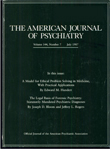This work's major thesis is that 12-step programs such as Alcoholics Anonymous (AA) and Narcotics Anonymous are ultimately indispensable ingredients in the treatment of addiction. That is bound to be controversial in psychiatry, at least in the context of the practice guidelines published by APA in November 1995 (
1). That document refers to such self-help groups as adjunctive and probably helpful in many cases. Dr. DuPont briefly mentions traditional psychiatric interventions, but he as much as says they are useful to the extent that they get addicts into 12-step, abstinence-based fellowships, in which they need to be involved for life. An addict does not recover but is recovering.
Dr. DuPont has impressive credentials. In addition to 25 years of clinical practice, he has served under three presidents as director of the National Institute on Drug Abuse. He has been certified in psychiatry, addiction medicine, and addiction psychiatry. He also has potentially controversial views. He wants us to do much more than we are doing to prevent young people from developing addiction and to force addicts into treatment. He advocates more mandatory drug testing, including in schools, and making the consequences of drug abuse stiffer. He is for “raising the bottom” for addicts.
There are four stages of addiction: fooling around, being hooked, hitting bottom, and recovering. Dr. DuPont acknowledges that there are many who can go no farther than the first stage, but he does not recommend it. Anyone can become addicted to the many reward-producing substances because of their profound effect on the pleasure centers of the brain. Everyone has those centers, but there are personal and environmental risk factors that heighten the danger of becoming addicted. Youngsters with character disorders are prime candidates for addiction and should never experiment with alcohol or other drugs. Families need to be vigilant and have a clear plan for dealing with the threat of nonmedical drug use by the children, including clear expectations of abstinence. Parents also need to establish the consequences, within the family, of failure to follow the rules.
Dr. DuPont sees the treatment of codependency as essential to effective intervention with the identified patient. Parents and spouses need Al-Anon as badly as the addict needs AA.
Addicts are self-centered and dishonest by definition. To the extent that their loved ones enable them to deceive themselves and others, they nourish the addiction. Anyone who is a codependent or has the potential to be one needs to know, says Dr. DuPont, that the addict's problem is not physical dependence but, rather, the appeal of the drug-caused high. The brain never forgets; that is why recovery is a lifelong process.
Dr. DuPont covers the subject of addiction from its history to predictions for the future. In a section of the preface entitled Hope for the Future, he predicts that the incidence of the disorder will increase, but he regards the recovery process as a “gift” to the recovering patient. I did not find this very convincing in terms of the prognosis for society. The Internet currently serves up prodrug propaganda, calls for repealing or weakening drug laws, and provides information about how to defeat drug testing and how to manufacture drugs (
2).
Dr. DuPont has written this volume for everyone who is not already knowledgeable about the concepts and information that he so clearly illuminates. He obviously recognizes that it is too thorough and detailed for many readers, so, in the preface, he tells us how to get the most of the good from it by reading through it selectively.

